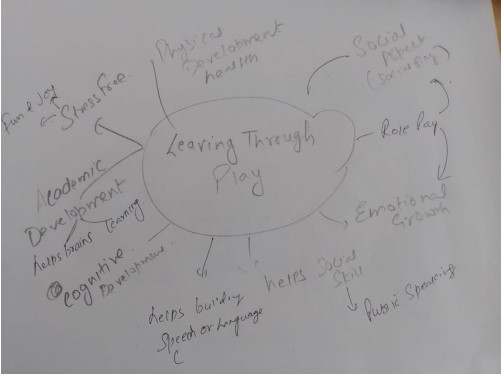Learning Through Play: A Holistic Approach to Early Childhood Development ECE2034
- Subject Code :
ECE2034
Concept: Learning Through Play
AI-Generated
Learning through play is an educational approach that capitalizes on children's natural inclination to explore and interact with their surroundings. This concept underscores that play is not just a leisure activity but a vital component of cognitive, social, emotional, and physical development.
Cognitively, play stimulates problem-solving skills and creativity. Activities such as building blocks or solving puzzles help children understand concepts like balance and spatial relationships, promoting their mathematical and scientific thinking. For example, stacking blocks to create a tower teaches principles of stability and gravity, offering practical insights into physics.
Socially and emotionally, play provides a framework for children to develop empathy and communication skills. Through role-playing and group activities, children practice cooperation, negotiation, and conflict resolution. They navigate various social interactions, learning to understand and respect diverse perspectives, which enhances their emotional intelligence and social competence.
Physically, play encourages the development of gross motor skills and overall fitness. Activities like running, jumping, and climbing improve coordination, strength, and endurance. Playgrounds and physical games enable children to explore their physical abilities in a dynamic, enjoyable manner, contributing to their overall health and physical development.
Language skills are also fostered through play. Engaging in storytelling, pretend play, and interactive games helps children expand their vocabulary and refine their communication abilities. As they express ideas, follow instructions, and engage in dialogue, they enhance their language proficiency and conversational skills.
Integrating learning with play involves creating environments that support exploration and creativity. Providing open-ended materials and facilitating guided play activities align with educational goals. By adopting this approach, educators and caregivers nurture well-rounded development, ensuring children remain motivated, engaged, and well-prepared for future learning experiences.
Learning Through Play Own Writing
Plays go deeper into the mind, as it is showing and not telling. When kids themselves feel and understand different aspects of life through play it becomes a wonderful tool to make them realize and remember the outcomes deeply. Learning through play is an essential developmental approach in children Elkind (2007). Through plays, we can bring complete development across their emotional, social, analytical, and physical aspects.
Plays are not just recreational activities but important elements of learning. It allows children to explore their environment, solve their problems, and engage in meaningful interactions. Play serves as a bridge between physical and analytical growth and enables children to connect motor skills with intellectual capabilities (Holistic Child Development, Murdoch University. ,2024). Kids can understand and learn and lot through body movements and facial expressions. Even through crawling toward their toy, they learn about their body and how to use it for different activities (Parenta, 2024). It helps in the development of awareness, coordination, and critical thinking.
Play provides a safe and natural environment for children to learn and process feelings, and emotions and practice empathy (Emotional and Personal Development, Murdoch University 2024). For example, pretend play scenarios allow children to cope with emotions, sadness, anger and understand others feelings, and develop emotional intelligence. Play nurtures both academic and emotional growth in a stress-free setting and encourages children to learn naturally. Role-play activities help kids to grow their emotional quotient as well as it aligns with the findings of Elkind (2007), who emphasizes that play nurtures both academic and emotional growth due to a stress-free environment.
Playing with kids using songs and rhymes along with movement introduces new words, enriches their vocabulary, and helps them to understand language. Plays and games are powerful tools for developing communication and collaboration skills. Children engaging in group plays learn to communicate, negotiate, and resolve conflicts Learning through play is fundamental to childhood development. In early childhood when they cannot understand and communicate verbally, plays and activities work as a tools to make them learn, understand, and analyse their world because together they learn the social skills also Pellegrini (2019). It naturally encourages them to learn emotions, words, numbers, science, and technology.
Mind Map

Figure 1: Mind Map
(Source: Self-illustrated)
Are you struggling to keep up with the demands of your academic journey? Don't worry, we've got your back!
Exam Question Bank is your trusted partner in achieving academic excellence for all kind of technical and non-technical subjects. Our comprehensive range of academic services is designed to cater to students at every level. Whether you're a high school student, a college undergraduate, or pursuing advanced studies, we have the expertise and resources to support you.
To connect with expert and ask your query click here Exam Question Bank

